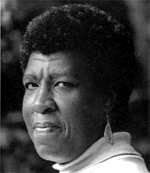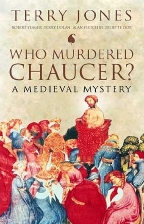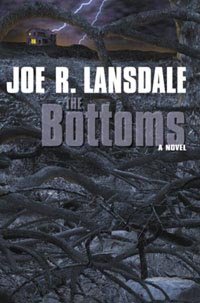Mood:
Now Playing: A funeral dirge
Topic: Focus on Author

With great sadness, we should mourn the passing of Octavia Butler at the untimely age of 58 last week. She was a great talent, a writer of great SF stories that focused on the human side, rather than oh-gee-whiz stuff. She shall be missed.
A lot was made about the color of Ms. Butler's skin when she was first published. I'll say this about that; she was just a great writer of stories. Her characters and stories were color-blind.
My favorite books by Octavia are CLAYS' ARK and WILD SEED. I admit, I had lost touch with her stuff in recent years, but plan to go back and reread some of it some day soon.
Here's the obituary, copyright the SEATTLE TIMES:
Octavia Butler, prominent science fiction author, dies at 58
By GENE JOHNSON
The Associated Press
SEATTLE – Octavia E. Butler, the first black woman to gain national prominence as a science fiction writer, died after falling and striking her head on the cobbled walkway outside her home, a close friend said Sunday. She was 58.
Butler was found outside her home in the north Seattle suburb of Lake Forest Park on Friday. She had suffered from high blood pressure and heart trouble and could only take a few steps without stopping for breath, said Leslie Howle, who knew Butler for two decades and works at the Science Fiction Museum and Hall of Fame in Seattle.
Butler's work wasn't preoccupied with robots and ray guns, Howle said, but used the genre's artistic freedom to explore race, poverty, politics, religion and human nature.
"She stands alone for what she did," Howle said. "She was such a beacon and a light in that way."
Fellow Seattle-based science fiction authors Greg Bear and Vonda McIntyre said they were stunned by the news and called it a tremendous loss.
"People came the world around to talk to her," Bear said. "She was sweet. She was smart. She knew science fiction and how to work with it."
Butler began writing at age 10, and told Howle she embraced science fiction after seeing a schlocky B-movie called "Devil Girl from Mars" and thinking, "I can write a better story than that." In 1970, she took a bus from her hometown of Pasadena, Calif., to East Lansing, Mich., to attend a fantasy writers workshop.
Her first novel, "Kindred," came out in 1979. It concerned a black woman who travels back in time to the South to save a white man. She went on to write about a dozen books, plus numerous essays and short stories. Her most recent work, "Fledgling," an examination of the "Dracula" legend, was published last fall.
She won numerous awards, and most notably in 1995 became the first science fiction writer granted a "genius" award from the John D. and Catherine T. MacArthur Foundation, which paid $295,000 over five years. She served on the board of the Science Fiction Museum.
Peter Heck, a science fiction and mystery writer in Chestertown, Md., said Butler was recognized for tackling difficult and controversial issues, such as slavery.
"She was considered a cut above both in the quality of her writing and her imaginative audacity," Heck said. "She was willing to take uncomfortable ideas and pursue them further than a lot of other people would have been willing to."
Heck's wife, Jane Jewell, executive director of the Science Fiction and Fantasy Writers of America, called Butler one of the first and definitely the most prominent black woman science fiction writer, but said she would have been a major writer of science fiction no matter her race or her gender.
"She is a world-class science fiction writer in her own right," Jewell said. "She was one of the first and one of the best to discuss gender and race in science fiction."
Butler described herself as a happy hermit, and never married. Though she could be very private, Bear said, she had taken classes to improve her public speaking and in recent years seemed more outgoing.
"Mostly she just loved sitting down and writing," he said. "For being a black female growing up in Los Angeles in the '60s, she was attracted to science fiction for the same reasons I was: It liberated her. She had a far-ranging imagination, and she was a treasure in our community."
Copyright ? 2006 The Seattle Times Company
Posted by mrnizz
at 10:29 AM EST


 Most of us remember Terry Jones as "the Nude Man" from Monty Python's Flying Circus, or "King Pellinore" from Monty Python and the Holy Grail, or Brian's obnoxious mum in "The Life of Brian". So it's hard to grasp that that same Terry Jones who used to dress in drag and make silly faces on TV is really quite a gifted and clever author, and a learned fellow to boot. I had some prior experience with Jones' kid's fiction: ERIK THE VIKING, NICOBOBINUS, and one of his history books: CHAUCER'S KNIGHT: A MEDIEVAL MERCENARY, so I knew what he was about.
Most of us remember Terry Jones as "the Nude Man" from Monty Python's Flying Circus, or "King Pellinore" from Monty Python and the Holy Grail, or Brian's obnoxious mum in "The Life of Brian". So it's hard to grasp that that same Terry Jones who used to dress in drag and make silly faces on TV is really quite a gifted and clever author, and a learned fellow to boot. I had some prior experience with Jones' kid's fiction: ERIK THE VIKING, NICOBOBINUS, and one of his history books: CHAUCER'S KNIGHT: A MEDIEVAL MERCENARY, so I knew what he was about. There's a guy in my office that is one of the most rabid Harry Turtledove fans I know; he reads virtually anything HT writes in the novel line (except the blatant fantasy stuff). I am not like that guy. I enjoyed Turtledove's early work (especially AGENT OF BYZANTIUM) but I don't feel like his talents lay in the area of the larger novel. Turtledove can write a wickedly good alt-history short story with a twist ending at the drop of a hat, and he can edit compendiums of similar material. His novels tend to be overly long, hugely repeitive and so complex each one requires a glossary appendix.
There's a guy in my office that is one of the most rabid Harry Turtledove fans I know; he reads virtually anything HT writes in the novel line (except the blatant fantasy stuff). I am not like that guy. I enjoyed Turtledove's early work (especially AGENT OF BYZANTIUM) but I don't feel like his talents lay in the area of the larger novel. Turtledove can write a wickedly good alt-history short story with a twist ending at the drop of a hat, and he can edit compendiums of similar material. His novels tend to be overly long, hugely repeitive and so complex each one requires a glossary appendix. 





 Lucius Shephard is one of the few real true characters working in fiction today. Reading interviews about his life and work makes his real life adventures come off as cool as anything he writes about in his stories.
Lucius Shephard is one of the few real true characters working in fiction today. Reading interviews about his life and work makes his real life adventures come off as cool as anything he writes about in his stories.